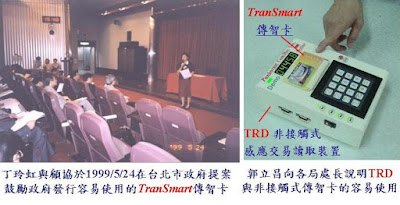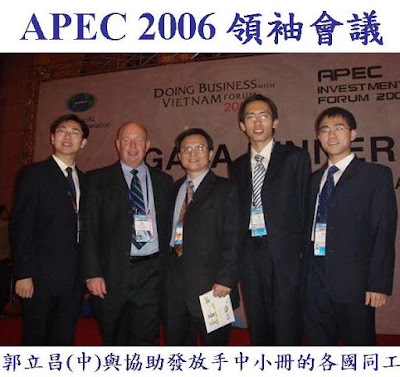2020年的APEC領袖宣言(Leaders’ Declaration)重點:
1.確保ICT資通訊科技之應用;
2.繼續支持可多國參與的貿易系統(multilateral trading system)。
文/郭立昌
「政策」凌駕於「科技」之上,惟政策的形成過程相當緩慢,是故,俟政策成型時,應快步跟上,才得以使我們的社會充滿生命力、我們的產品充滿國際競爭力。
2020年的APEC領袖會議由馬來西亞主辦,主辦單位從吉隆坡透過視訊會議和各經濟體政經領袖探討年度主題—「優化人類潛力、實現共享繁榮而有活力的未來」,依照優先順序調整了工作項目如下:「改善貿易和投資的路徑,通過數位經濟和技術實現包容性經濟參與,以及推動永續的創新。」惟「新冠疫情(COVID-19 Pandemic)」繞著整個議程,變成大會的焦點。領袖們承諾會保護人民的生活和健康,因疫情而產生的經濟衝擊也有所因應—決心沿著堅定/平衡/包容/永續/創新和安全的經濟成長之路,協同一致的行動與合作比以往更為重要,以克服疫情的挑戰,並實現普遍性繁榮的新機遇,進而促使區域經濟邁向復甦。末了,領袖宣言(Leaders’ Declaration)指出未來的兩大重點產業:「一是ICT,一是可多國參與的貿易系統。」領袖們鼓勵發展數位基礎建設—即我們提的「ICT控制中心」—預計資訊流產值為50億美元/ZB,發展虛實整合的商業系統,使消費者(Consumer)和企業(Business)相信數位經濟將能使「人民/企業/政府」皆同得益處。
自從我們1997年帶著所發明的新科技經濟系統—「電子商店系統 (The eStore
System, TES)」到溫哥華APEC宣揚之後,使得茂物目標(Bogor Goal)有了一個工具型的解決方案 (Instrumental Solution)—如今要開始驗收成果了。今年因新冠疫情蔓延,我們在2003年APEC的「衛生倡議」成了被讚賞的標的;而我們發明的「非現金 (Cashless)」交易制度今年也因疫情之故,而使得當年的「衛生」預警被津津樂道,交易額預計達到「36兆美元」 (約新台幣壹仟兆元)—被譽為史上最偉大的發明。
文明的演進,是一步一腳印,特別是「政策的形成」更是年復一年地討論/對話,經過各經濟體專家貢獻其智慧和知識,才逐漸成型。1986年時,有位名叫「丁玲虹」的年輕婦人,因預見未來有「全球性失業問題」,於是走出安逸的生活創業以解決一百個失業問題,更因此發現失業乃結構性的問題,需要一個能量強大、且放諸四海皆準的「創新產業」,所以發明了「TES」—稱為「電商倡議」,同時自食其力實現發明;當有了具體成果時,才帶至APEC 1997廣事傳播其可多國參與的利益,也因此爭取到1998年馬來西亞APEC講師資格,9月3日在吉隆坡會場的講台上,丁玲虹(Linda Din)為飽受亞洲金融風暴所苦的經濟體提供「Taiwan BEST」的良藥。
時任K-Horn Science Inc.董事長的講師丁玲虹女士,在1998年9月4日的任務小組(Task Force)會議裡,聯合美國代表在APEC講台上提案「Electronic Commerce (電子商務)」通過—從此「電商倡議」有了法源依據;結論傳回各經濟體,大家協同一致地展開相關「基礎建設」—例如電信/光纖網路/基地台等等。時任總統的李登輝先生則指示成立「商業電子化暨產業自動化」(簡稱EB)的推動小組,使台灣和美國同步發展電商產業相關的法令/規章及軟硬體設施。
丁玲虹在1998年11月成立「磐虹科技股份有限公司」,K-Horn Science Inc.則掖注所需的各項資源,使之快速地補足在APEC提案的工具型解決方案。1999年3月20日,行政院長蕭萬長先生率閣員來磐虹實驗室視察,丁玲虹則向他們解說:「電子商務關鍵防火牆軟硬體研發攸關於台灣未來產業的國際競爭力----」
爭取到1999年4月紐西蘭APEC的「強力督促各經濟體落實電子商務」之結論時,立昌即刻以《使命》向層峰建言,獲得正面回應;5月24日,丁玲虹在台北市政府會議廳講台上說明「電子商店系統」的重要性,立昌則以手提式「非接觸式傳智卡及其交易讀取裝置」向各局處長講解:「因傳智卡具有『可計程』及『好用(easy-to-use)』宜率先應用於北捷---」獲得正面的回應。
當時擔任台北市長的馬英九先生也有回應:「郭立昌君,有關台端戮力發展優勢產業,並據以主動進行產業外交,成效卓越,令人感佩,所贈《使命》一書,對未來電子商務的發展與應用等均有精闢的見解,令人印象深刻,本府將留供未來民間電子商務發展之重要參考,並對台端之贈舉特申謝忱。市長馬英九 1999/6/1」
丁玲虹感於實際的需要,特於APEC 2000汶萊會議中,推動「ICT倡議」—就是在「IT」之間加入「C」(指電信,Communication);立昌進一步在上海APEC強調ICT的重要性,促使其被納入2001年的APEC領袖宣言之中。
2003年SARS疫情肆虐這地,APEC的發起國澳洲政府有感於區域經濟發展失衡的問題日趨嚴重,故向21個經濟體邀稿,期望「Addressing the Needs of SMEs (解決中小企業的需要)」;丁玲虹(Linda Din)的提案獲選為四個提案之一,也受邀擔任2003年泰國APEC講師,在「Growing the APEC SME Exporters Community (成長中的亞太經合會出口社群)」說明其提案「Global Cannel(全球通路)-TES」將為區域經濟建立一個安全及有效益的「新經濟範本 (New Economy Model)」以刺激經濟景氣(to stimulate the regional economy)。玲虹在講台上解說道:
在此謹介紹一個新的「全球通路(Global Channel)-電子商店系統 (The eStore System)簡稱為TES」,此系統可促成:
1. 創造新商業通路,增進貿易機會。
2. 發明-讓智慧財產權(IPR)成為新的金融商品。
3. 成為電子商務之可行的商業範本,活絡企業與企業、企業與個人(B to B / B to C)貿易往來。
4. 傳統產業科技化、科技產業智慧化。
5. 培育50萬個微型企業。
6. 為婦女創造就業機會-One eStore One Business One Job。
7. 安全有效的新通路 (非現金交易及自動傳訊)。
8. 衛生及環保 (應用非接觸式感應科技)。
「全球通路-TES」是用射頻(RF)轉換之非接觸式感應卡為交易工具,交易資訊可自動透過電話線,傳送至控制中心處理後,自動通知供應商補貨,形成一個封閉系統(Closed Loop)。TES已完成實地考察(Due Diligence)的工作,多年來,多次赴美國、中國、日本、歐洲等地實地考察應用地點;例如日本北海道,一年的寒冷時間很長,這種10平方公尺的小店,從升級傳統自動販賣機切入,可配置一位「行動店長(Mobile Store-Keeper)」彈性工作,消費者可以24小時從店外直接購物。只要一個小小的巴士站牌(Bus Stop),就可以開「電子商店(eStore)」,讓等車的人可以消費,感應卡同時可以當車票使用,促使新產品快速流通;電子商店銷售各種習知的商品,例如食品、飲料、相機、磁片、手錶、飾物…等等,消費者消費後,馬上拿到商品,並取得發票,商店會自動將交易資訊透過區域POS,傳送回「企業的控制中心」,即時掌控金流及商流。(丁玲虹,2004:22-23)
上述會議是澳洲政府,在亞太經合會中自費主辦的,計畫主持人葛蘭杜利先生(Grant Dooley),特別期望我在第一輪(Panel I)的研討時,能為「中小企業出口需要提出精闢的建言 (Addressing the Needs of Small Business Exporters)」;這些建言的結論,將有助於「未來法案工作的成型」,並會在次日被提報於中小企業工作小組(SME Working Group)會議之中。(丁玲虹,2004:19)
從《全球通路-TES》(丁玲虹,2004)書中摘錄出來的這段說明,可以看出國際會議的重要性—它必須經由「小組會議 (Sub-group Meeting)」提案,選出最具有可行性的提案,提交給部長會議,俾幫助「未來法案工作的成型」;進而提交至領袖會議,經各經濟體領袖認同後發表宣言,各經濟體再同步展開相關的工作及舉措。丁玲虹的提案,因為有具體的工具—已有研發成果,而且根據各國專利證書提案,被一致認為是「最佳實例 (The Best Practice)」,乃是茂物目標(Bogor Goal)之「可多國參與的貿易系統 (Multilateral Trading System)」的最佳工具型解決方案 (Instrumental Solution),預計是2.4億人創業的最佳導引(Guidance)。(請參閱APEC 2003部長聯合宣言)
此後,立昌受邀至APEC 2006領袖會議報告「Global Channel-TES」的進度,再經過十幾屆的領袖會議反復討論,終於因為一個新冠疫情(COVID-19),使各經濟體領袖不得不正視「先知預言」,以及善用其工具來解決經濟上的挑戰;個人在五月即參與相關事工,重申虛實整合的商業系統—「電子商店系統 (TES)」乃是王道的建言。2020年11月20日,APEC 2020領袖宣言指出與有關我們當年提案的兩大重點產業:「確保ICT資通訊科技之應用,繼續支持可多國參與的貿易系統 (multilateral trading system)。」同時指出未來20年的願景—「APEC布城願景2040 (The APEC Putrajaya Vision 2040)」,領袖們宣布:「這是一個新的願景,主要描繪了我們地區的未來;這個願景是到2040年建立一個『開放、充滿活力、有彈性及和平』的亞太社群,以實現我們全體人民和子孫後代的繁榮;我們責成高官們 (Senior Officials)完成一項全面的實施計劃,以供我們在2021年審議。」
◎作者郭立昌為APEC領袖會議代表,國際知名科技專家,早年創造台灣的精密工業,累積龐大的資源進行社會責任投資,被稱為產業傳道人,因亟欲落實「富裕台灣計畫」而遭海島貪腐集團攻擊,惟在APEC領袖會議促成「反貪腐、資通訊科技(ICT)、可多國參與的貿易系統、衛星支援商用…」等法案;著有「為下一代開出路、公義的經濟社會、社會責任、W型社會、為台灣開出路…」等書。
參考文獻:
丁玲虹(2004)。公全球通路-TES。台中:磐虹。
APEC Leaders Issue Kuala Lumpur Declaration
Invented by Linda Din
https://patents.google.com/patent/US6304796B1 (VAM)
https://patents.google.com/patent/US20030197061 (Shopping System)
https://patents.google.com/patent/US20030107468A1/en (Entry security device)
https://kuo-social-service.blogspot.com/2015/12/a-hundred-year-old-teacher-mr-ma-chen.html (馬承九老師)
http://plckbooks.blogspot.com/2018/08/k-horn-science-inc.html (K-Horn Science Inc.的由來)
http://plckbooks.blogspot.com/2018/08/blog-post_20.html (社會責任宣言)
http://wtgtintwn.blogspot.com/2018/08/blog-post.html (衛星支援倡議)
http://pklctpp.blogspot.tw/2018/04/blog-post.html (台灣第三部門與資訊社會的發展)
http://tnews.cc/07/newscon64680.htm(黑手博士的政治啟示)
https://lindadin58.blogspot.com/2018/03/ei.html (EI經濟學院)
https://lindadinkh.blogspot.com/2018/05/blog-post.html (六祖法寶壇經與我)
http://pkoldstory.blogspot.com/2018/10/blog-post.html (郭立昌談心經)
https://wtgtintwn.blogspot.com/2018/12/blog-post.html (郭立昌論國際移動能力)
https://lcthesis.blogspot.com/2019/01/blog-post_63.html (倡議型NGO與國際交流平台)
https://pklctpp.blogspot.com/2019/01/cptpp.html (日本主導CPTPP生效)
https://pkoldstory.blogspot.com/2019/03/blog-post_15.html (姚靜波教授與我)
https://plckbooks.blogspot.com/2020/03/blog-post.html (為下一代開出路--從精密工業到微奈米科技)
https://klcpcm.blogspot.com/2020/07/blog-post.html (動力晶片的發明)
https://pkoldstory.blogspot.com/2020/07/blog-post_31.html (心靈導師 李登輝)
https://wtgtintwn.blogspot.com/2020/08/blog-post.html (讀書多 身體疲倦)
https://wtgtintwn.blogspot.com/2020/08/blog-post_25.html (君子謀道不謀食)
https://pkoldstory.blogspot.com/2020/08/blog-post.html (平安金卡)
https://wtgtintwn.blogspot.com/2020/10/blog-post.html (學習半途而廢)
https://lcthesis.blogspot.com/2020/10/economy.html (神的工作—“Economy”)
https://pktwn.blogspot.com/2020/10/blog-post.html (緬懷 梅可望校長)
https://ldtesbooks.blogspot.com/2020/10/blog-post.html (創業是解決失業的最佳管道)
https://lindadin58.blogspot.com/2020/10/blog-post.html (丁玲虹發明的電子商店系統)
https://ldinvention.blogspot.com/2020/10/blog-post.html (丁玲虹發明的非現金交易制度)
https://lindadin90.blogspot.com/2020/10/blog-post_30.html (丁玲紅的ICT倡議)
https://pkpreaching.blogspot.com/2020/10/blog-post.html (年紀大 勿燒腦)
https://wtgtintwn.blogspot.com/2020/11/blog-post.html (資訊經濟的天命)
https://pkpreaching.blogspot.com/2020/11/blog-post_15.html (兒子的講道聽後感)
https://wtgtintwn.blogspot.com/2020/11/6g.html (6G的研發已經啟動)
https://pkpreaching.blogspot.com/2020/11/blog-post_19.html (聽說一天要睡七小時才對)
APEC 2020領袖宣言內容如下:
THE 27TH
APEC ECONOMIC LEADERS’
MEETING
20
November 2020
Kuala Lumpur
2020 Kuala Lumpur Declaration
We, the Economic Leaders of APEC, stand united in our determination to enable the Asia-Pacific region to successfully recover from the COVID-19 pandemic and its economic impacts. We are committed to protecting our people’s lives and safeguarding their health. We resolve to further navigate the region towards recovery along the path of strong, balanced, inclusive, sustainable, innovative and secure economic growth. Our coordinated action and cooperation are more important than ever to overcome the challenges of COVID-19 and realise new and emerging opportunities for prosperity for all.
COVID-19 is one of the most challenging health and economic crises of our times. We express our deepest condolences to those who have suffered and lost loved ones. We are saddened by the devastation to jobs and livelihoods as a result of widespread economic disruption and we are grateful to those serving on the frontline.
We are meeting virtually for the first time in our history under the APEC 2020 theme of Optimising Human Potential towards a Resilient Future of Shared Prosperity. Pivot. Prioritise. Progress. We have aligned our efforts along the priorities of: Improving the Narrative of Trade and Investment; Inclusive Economic Participation through Digital Economy and Technology; and Driving Innovative Sustainability.
Combatting and Mitigating the Impacts of COVID-19
We will continue to work together to use all available policy tools to support an inclusive, effective and sustained response to COVID-19, minimising its impact on people’s livelihoods. We recognise the need to enhance stimulus measures that facilitate economic recovery and job creation. In facilitating economic recovery, we underscore the importance of improving fiscal sustainability and transparency to support long-term resilient economic growth and future financing needs. We acknowledge the need to support developing economies in combatting COVID-19. We also welcome the recent establishment of a digital platform for coordinated information sharing on policy responses related to COVID-19. We commend the varied and continued efforts as well as the contribution of additional resources across APEC to combat the pandemic and support workers and sectors through the economic recovery process.
We will cooperate to facilitate the movement of essential goods and services, as well as the essential movement of people in a safe manner, identifying and resolving unnecessary barriers to trade and strengthening the resilience of our supply chains. We recognise the importance of working together to ensure trade and investment can continue to flow in these trying times. We are encouraged by the implementation of measures that facilitate trade and urge Economies to ensure emergency trade measures designed to tackle COVID-19 are consistent with World Trade Organisation (WTO) rules.
We recognise that science, technology and innovation are important to the region’s post-COVID-19 recovery. We reaffirm the need to cooperate constructively on COVID-19 including the research and development, production, manufacturing and distribution of diagnostic tests, essential medical products and services, therapeutics and vaccines. We highlight the importance of facilitating equitable access to safe, quality, effective and affordable vaccines and other medical countermeasures (疫苗和相關醫療對策) that are vital to safeguard people’s health and well-being, while incentivising innovation. We acknowledge that the role of extensive immunization (廣泛的免疫作用) against COVID-19 is critical in order to bring the pandemic to an end. (以便終止疫情蔓延)
We recognise the importance of the development and contribution of digital technologies in safeguarding people’s health and protecting the region from health threats, and enhancing resilience, scalability and sustainability of health systems, thereby moving towards universal health coverage.
APEC Putrajaya Vision 2040
We proclaim the APEC Putrajaya Vision 2040, a new vision that primarily charts the future of our region. Our Vision is an open, dynamic, resilient and peaceful Asia-Pacific community by 2040, for the prosperity of all our people and future generations. We task our Senior Officials to complete a comprehensive implementation plan for our consideration in 2021.
Improving the Narrative of Trade and Investment
We welcome the significant progress made under the Bogor Goals, including the final review of APEC’s Progress towards the Bogor Goals, in facilitating trade and investment, and recognise more needs to be done in fostering an enabling environment for trade and investment in the Asia-Pacific region.
We recognise the importance of a free, open, fair, non-discriminatory, transparent and predictable trade and investment environment to drive economic recovery at such a challenging time. In this regard, we reaffirm our support for agreed-upon rules of the WTO in promoting the stability and predictability of international trade flows. We take note of the call of the APEC Business Advisory Council (ABAC) for APEC to continue supporting the multilateral trading system.
We will continue to support the on-going work at the WTO, including through its necessary reform aimed to improve its functioning, and will continue to work on appropriate capacity building initiatives to implement WTO agreements. We call for expedited progress in the on-going WTO negotiations on fisheries subsidies. APEC member participants in Joint Statement Initiatives (JSI) call for progress in the lead-up to the 12th WTO Ministerial Conference (MC12), recognising the e-commerce initiative is particularly important in supporting COVID-19 recovery.
We will further advance the economic integration in the region, in a manner that is market-driven, including through the work on the Free Trade Area of the Asia-Pacific (FTAAP) agenda, which will contribute to high quality and comprehensive regional undertakings. We underscore the importance of improving regional connectivity through quality infrastructure development and investment based upon relevant APEC work.
Inclusive Economic Participation through Digital Economy and Technology
Innovation and digitalisation enable governments, businesses and people to carry out their activities and empower inclusive economic participation by all. We will foster an enabling environment for the development of the digital economy, including to open new opportunities for Micro, Small and Medium Enterprises (MSMEs). We aim to promote innovative technologies and foster a reliable, interoperable, open, accessible and secure ICT environment, narrow the existing digital, skills and regulatory gaps, and encourage development in digital infrastructure and transformation. We acknowledge the importance of cooperation in facilitating the flow of data and strengthening consumer and business trust in digital transactions.
We recognise the disproportionate impacts of COVID-19 on MSMEs, women and others with untapped economic potential. We intend to pursue inclusive economic policies that support their recovery and growth through effective and equal participation in economic activities and opportunities to contribute to economic recovery efforts. We support and welcome the implementation of the La Serena Roadmap for Women and Inclusive Growth.
COVID-19 has transformed the way we work and accelerated the transitions to the future of work setting. We recognise the need for continued structural reforms to improve the ways of doing business and unleash economic prosperity for our people, including accelerating cooperation on digital literacy and skills development to harness technological transformation, and encouraging the use of digital technology to resolve cross-border business-to-business disputes. We aim to advance efforts to promote human resource development, and strengthen economic and technical cooperation, to ensure all affected economic sectors and workers are afforded appropriate support in expediting their economic recovery. We are encouraged by the broader on-going efforts on economic, financial and social inclusion that contribute to narrowing the gap in economic development, and advance the well-being for all, in support of global efforts, including the 2030 Agenda for Sustainable Development.
Driving Innovative and Inclusive Sustainability
We will foster comprehensive quality growth and advance work to this effect, including on the APEC’s human security agenda, in order to recover from COVID-19.
We reaffirm our support for economic and technical cooperation, as well as structural reforms, that drive innovation, productivity and sustainable growth. We encourage inclusive recovery from COVID-19 that increases employment and economic activity. Recognising the impact of COVID-19 on global food supply chains, we will work to ensure food security through sufficient, safe, and nutritious food that continues to be available and accessible to people across the region, while reducing food loss and waste.
We will collaborate to facilitate access to affordable energy, enhance energy resilience and energy security using the widest variety of fuels and technologies to support sustainable economic growth and promote transitions to cleaner energy as part of a strong and inclusive economic recovery.
We are hopeful that new technologies are available and accessible to allow us to handle resources and waste more sustainably, and in a holistic manner. We will promote economic policies and growth that support global efforts to tackle climate change, extreme weather and natural disasters, and strengthen emergency preparedness.
Strengthening Stakeholder Engagement
We note the recommendations from ABAC and welcome partnership with the private sector to support efforts towards economic recovery. We also welcome the contributions of the Pacific Economic Cooperation Council, and the value that the ASEAN Secretariat, Pacific Islands Forum, stakeholders, and other international and regional organisations bring to APEC.
We welcome the outcomes of the APEC Ministerial Meeting as well as Sectoral Ministerial Meetings for Trade, Health, Finance, Women and the Economy, Small and Medium Enterprises, and Food Security.
We thank Malaysia for its able leadership in this particularly challenging year. We look forward to New Zealand’s chairing in 2021.







